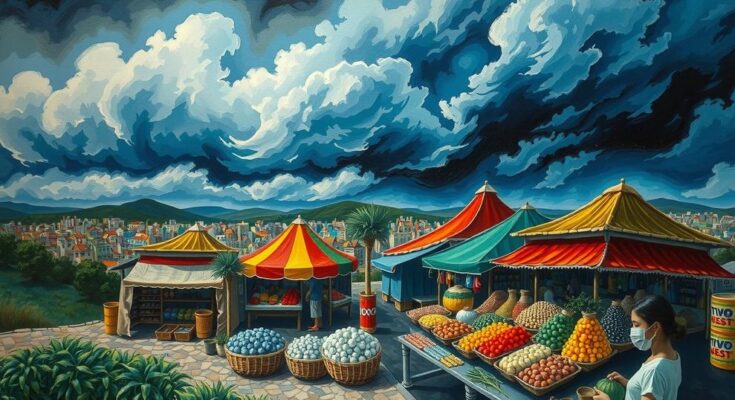Malawi is facing unrest due to record-high inflation and economic challenges ahead of September elections. Protests have erupted as food prices soar, with essential goods becoming increasingly unaffordable. The government has attempted to address these challenges through import bans, but critics argue there is no clear strategy for economic stability. President Chakwera confronts pressures as he prepares for a difficult re-election campaign.
Malawi is currently witnessing significant unrest due to surging prices ahead of the September elections, amidst an unprecedented economic crisis. In the vibrant Tsoka second-hand clothing market of Lilongwe, vendors are struggling with an inflation rate that reached 30% year-on-year as of February. This economic strain prompted Steve Magombo, leader of the vendors’ association, to rally 5,000 vendors in a march to parliament, marking a substantial demonstration in the capital recently.
Protests have similarly spread to at least four additional cities, reflecting a pervasive public discontent in a nation where approximately 75% of its 21 million citizens live in extreme poverty. The crisis has severely impacted food prices, with inflation affecting staple items like maize, which soared by 38.5% in February. Since December, a 50kg bag of maize has surged to 110,000 kwacha ($63), substantially higher than the monthly minimum wage of $52, or $26 for domestic workers.
The economic turmoil has been exacerbated by the dramatic devaluation of the Malawian kwacha, which has lost over half of its value since 2022, resulting in heightened import costs and creating a vicious cycle of inflation. James Woods, a UK-based policy expert, commented, “For a net-importing country, the collapse of the kwacha has been catastrophic, fuelling import costs and further stoking inflation.”
In response to the economic challenges, the government has imposed bans on imports of specific goods to stimulate local production, including Irish potatoes and various essential food items. However, critics assert that there is no coherent plan to stabilize the economy. Gift Trapence, leader of the Human Rights Defenders Coalition, opined, “The government seems to have no clue on how to bring the economy back on track.”
President Lazarus Chakwera, who secured victory with 58% of the vote in 2020, faces mounting pressure as he prepares for a tough re-election battle against former President Peter Mutharika. The escalating economic crisis necessitates urgent government action to win over voters in the upcoming elections.
The economic crisis in Malawi, highlighted by significant inflation and public unrest, poses severe challenges for the government as elections approach. With food prices soaring and public discontent growing, President Chakwera must address these issues swiftly to secure voter support. The effectiveness of current government measures to stabilize the economy remains critically questioned, highlighting the urgency of effective leadership in these trying times.
Original Source: newscentral.africa




